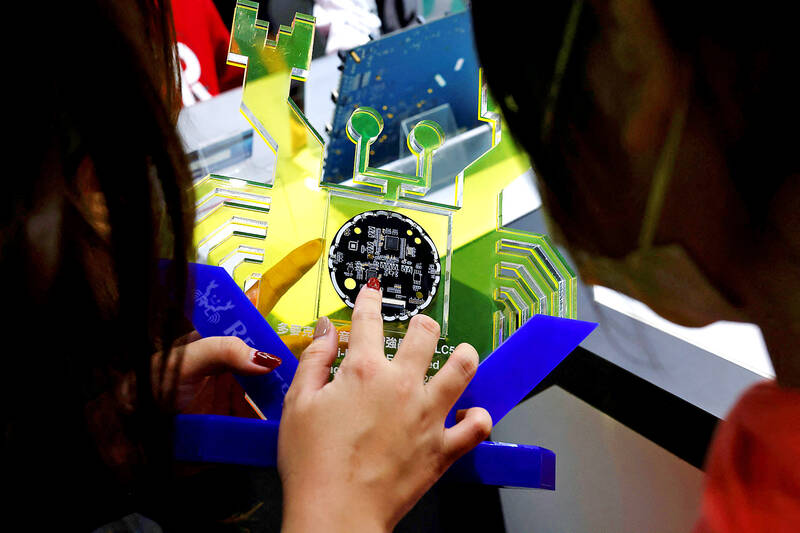The climate monitor for the nation’s manufacturing sector in December last year was “blue” for the second consecutive month, as global inflation and interest rate hikes lowered demand and prices for most products, the Taiwan Institute of Economic Research (TIER, 台灣經濟研究院) said yesterday.
The TIER business composite index shed 0.24 points to 9.48, indicating a recessionary state, after the sub-indices on demand and selling prices weakened, but the readings for operating conditions, costs and raw material prices improved marginally, the Taipei-based think tank said.
Major customers continued to adjust inventory to cope with soft end-market demand amid a global economic slowdown and monetary tightening, the institute said, adding that Taiwan’s latest exports and export orders declined by double-digit percentage points for two months in a row.

Photo: Ann Wang, REUTERS
China’s recent scrapping of COVID-19 restrictions increased infections in the country, disrupting supply chains, but fueling hopes for a fast recovery, it said.
TIER uses a five-color spectrum to capture the industry’s movements, with “red” indicating a boom, “green” suggesting a steady state and “blue” signifying a downturn. Dual colors indicate a transition to a better or worse condition.
The number of firms in business decline jumped from 59.04 percent in November last year to 73.63 percent in December, and none reported a boom, TIER said.
Demand for electronics used in high-performance computing and electric vehicles remained solid, but sales of smartphones and notebook computers stalled, as global consumers cut back spending on technology gadgets, it said, adding that it caused the business climate for the sector, which is the main export driver, to signal “blue.”
The climate monitor for petrochemical and plastic sectors was also “blue,” as labor shortages in China deteriorated due to spiking virus infections, the institute said.
Firms generally reported a retreat in business, and grew conservative in input and inventory management, it said.
Suppliers of necessity goods such as paper and textile products fell from the “yellow-blue” to “blue” state, as firms wrote off inventory losses to reflect poor demand and selling prices, TIER said.
Makers of metal products continued to struggle with sluggish demand even after major global players cut capacity to ease the imbalance between supply and demand, it said.
Machine equipment vendors held particularly gloomy views, as soft global economic outlook prompted customers to be frugal about buying capital equipment, it said.
Auto parts suppliers said they also took a hit from an overall decline in purchases of durable goods.
The number of new vehicle plates increased by 3.84 percent to 41,900, as consumers sought to avoid price hikes by major vehicle brands this year, rather than a recovery in the business, they said.

UNCERTAINTY: Innolux activated a stringent supply chain management mechanism, as it did during the COVID-19 pandemic, to ensure optimal inventory levels for customers Flat-panel display makers AUO Corp (友達) and Innolux Corp (群創) yesterday said that about 12 to 20 percent of their display business is at risk of potential US tariffs and that they would relocate production or shipment destinations to mitigate the levies’ effects. US tariffs would have a direct impact of US$200 million on AUO’s revenue, company chairman Paul Peng (彭雙浪) told reporters on the sidelines of the Touch Taiwan trade show in Taipei yesterday. That would make up about 12 percent of the company’s overall revenue. To cope with the tariff uncertainty, AUO plans to allocate its production to manufacturing facilities in

TAKING STOCK: A Taiwanese cookware firm in Vietnam urged customers to assess inventory or place orders early so shipments can reach the US while tariffs are paused Taiwanese businesses in Vietnam are exploring alternatives after the White House imposed a 46 percent import duty on Vietnamese goods, following US President Donald Trump’s announcement of “reciprocal” tariffs on the US’ trading partners. Lo Shih-liang (羅世良), chairman of Brico Industry Co (裕茂工業), a Taiwanese company that manufactures cast iron cookware and stove components in Vietnam, said that more than 40 percent of his business was tied to the US market, describing the constant US policy shifts as an emotional roller coaster. “I work during the day and stay up all night watching the news. I’ve been following US news until 3am

COLLABORATION: Given Taiwan’s key position in global supply chains, the US firm is discussing strategies with local partners and clients to deal with global uncertainties Advanced Micro Devices Inc (AMD) yesterday said it is meeting with local ecosystem partners, including Taiwan Semiconductor Manufacturing Co (TSMC, 台積電), to discuss strategies, including long-term manufacturing, to navigate uncertainties such as US tariffs, as Taiwan occupies an important position in global supply chains. AMD chief executive officer Lisa Su (蘇姿丰) told reporters that Taiwan is an important part of the chip designer’s ecosystem and she is discussing with partners and customers in Taiwan to forge strong collaborations on different areas during this critical period. AMD has just become the first artificial-intelligence (AI) server chip customer of TSMC to utilize its advanced

Six years ago, LVMH’s billionaire CEO Bernard Arnault and US President Donald Trump cut the blue ribbon on a factory in rural Texas that would make designer handbags for Louis Vuitton, one of the world’s best-known luxury brands. However, since the high-profile opening, the factory has faced a host of problems limiting production, 11 former Louis Vuitton employees said. The site has consistently ranked among the worst-performing for Louis Vuitton globally, “significantly” underperforming other facilities, said three former Louis Vuitton workers and a senior industry source, who cited internal rankings shared with staff. The plant’s problems — which have not